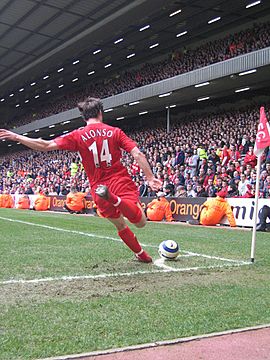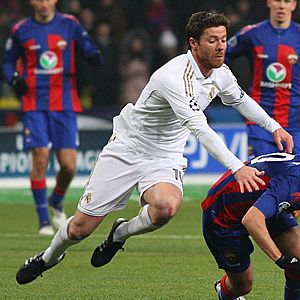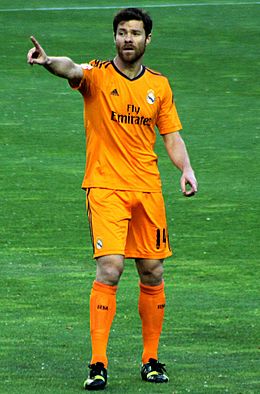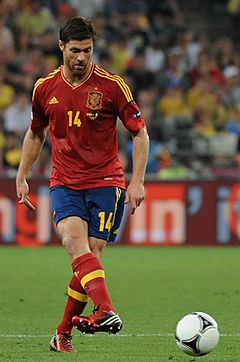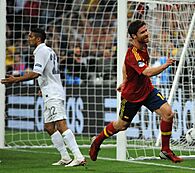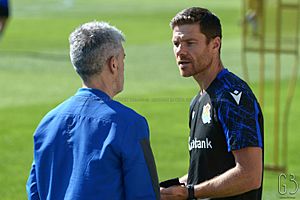Xabi Alonso facts for kids
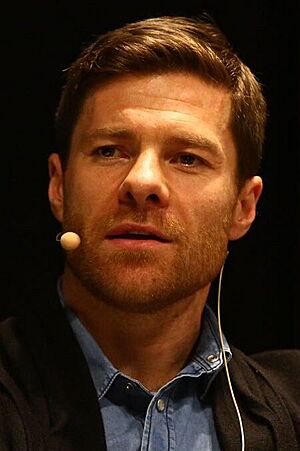
Alonso in 2018
|
|||||||||||||||||||||||||||||||
| Personal information | |||||||||||||||||||||||||||||||
|---|---|---|---|---|---|---|---|---|---|---|---|---|---|---|---|---|---|---|---|---|---|---|---|---|---|---|---|---|---|---|---|
| Full name | Xabier Alonso Olano | ||||||||||||||||||||||||||||||
| Date of birth | 25 November 1981 | ||||||||||||||||||||||||||||||
| Place of birth | Tolosa, Spain | ||||||||||||||||||||||||||||||
| Height | 1.83 m (6 ft 0 in) | ||||||||||||||||||||||||||||||
| Position(s) | Midfielder | ||||||||||||||||||||||||||||||
| Team information | |||||||||||||||||||||||||||||||
|
Current team
|
Real Madrid (head coach) | ||||||||||||||||||||||||||||||
| Youth career | |||||||||||||||||||||||||||||||
| 1990–1999 | Antiguoko | ||||||||||||||||||||||||||||||
| Senior career* | |||||||||||||||||||||||||||||||
| Years | Team | Apps | (Gls) | ||||||||||||||||||||||||||||
| 1999–2000 | Real Sociedad B | 39 | (2) | ||||||||||||||||||||||||||||
| 2000–2004 | Real Sociedad | 114 | (9) | ||||||||||||||||||||||||||||
| 2000–2001 | → Eibar (loan) | 14 | (0) | ||||||||||||||||||||||||||||
| 2004–2009 | Liverpool | 143 | (15) | ||||||||||||||||||||||||||||
| 2009–2014 | Real Madrid | 158 | (4) | ||||||||||||||||||||||||||||
| 2014–2017 | Bayern Munich | 79 | (5) | ||||||||||||||||||||||||||||
| Total | 547 | (35) | |||||||||||||||||||||||||||||
| International career | |||||||||||||||||||||||||||||||
| 2000 | Spain U18 | 1 | (0) | ||||||||||||||||||||||||||||
| 2002–2003 | Spain U21 | 9 | (0) | ||||||||||||||||||||||||||||
| 2001–2012 | Basque Country | 5 | (0) | ||||||||||||||||||||||||||||
| 2003–2014 | Spain | 114 | (16) | ||||||||||||||||||||||||||||
| Managerial career | |||||||||||||||||||||||||||||||
| 2019–2022 | Real Sociedad B | ||||||||||||||||||||||||||||||
| 2022–2025 | Bayer Leverkusen | ||||||||||||||||||||||||||||||
| 2025– | Real Madrid | ||||||||||||||||||||||||||||||
|
Medal record
|
|||||||||||||||||||||||||||||||
| *Club domestic league appearances and goals | |||||||||||||||||||||||||||||||
Xabier Alonso Olano (born on November 25, 1981), known as Xabi Alonso, is a Spanish professional football manager and a former player. He is currently the head coach of La Liga club Real Madrid. Many people consider him one of the best midfielders of his time. He was famous for his amazing passes and powerful long-distance shots. Today, he is also seen as one of the best young football managers in the world.
Alonso started his football journey at Real Sociedad, a team from his home area. After a short loan spell at Eibar, he became the team captain of Real Sociedad. They finished second in La Liga during the 2002–03 season. In 2004, he moved to Liverpool for about £10.5 million. He won the UEFA Champions League in his very first season, even scoring a goal in the final. Later, he also won the UEFA Super Cup, the FA Cup, and the FA Community Shield with Liverpool.
In 2009, Alonso joined Real Madrid in a deal worth £30 million. There, he won La Liga, two Copa del Rey titles, and another UEFA Champions League. He then moved to the German club Bayern Munich in 2014. With Bayern, he won three Bundesliga titles, including a double win (league and cup) in his second season. He retired from playing football in 2017.
Xabi Alonso played for the Spanish national team for the first time in April 2003. He helped Spain win Euro 2008, the 2010 World Cup, and Euro 2012. He also played for Spain in Euro 2004 and the 2006 World Cup. On June 23, 2012, Alonso played his 100th game for Spain in the Euro 2012 quarter-final against France. He scored both goals in that winning match. Alonso stopped playing for the national team after the 2014 World Cup. With 114 games played, he is the eighth most capped player in Spain's history.
After retiring as a player, Alonso coached Real Madrid's U14 team. In 2019, he became the manager of Real Sociedad B. He led them to promotion to the Segunda División in his second season. In 2022, Alonso was named head coach of Bayer Leverkusen. He achieved an amazing unbeaten domestic double in 2024, winning the club's first ever Bundesliga title and their first DFB Pokal since 1993. After two and a half successful years with Leverkusen, Alonso was appointed as the new head coach of his former club Real Madrid in June 2025.
Contents
Xabi Alonso's Early Life
Alonso was born in Tolosa, Gipuzkoa, a small town in the Basque Country. His family was well-known for football. His father, Periko Alonso, won La Liga twice with Real Sociedad and once with Barcelona. His father also played 21 games for the national team.
Xabi lived in Barcelona for his first six years. Then, his family moved to San Sebastián (Donostia). This is where his love for football truly began. He spent his childhood playing on Playa de la Concha (Shell Beach). There, he became friends with Mikel Arteta, who lived on the same street. They often played against each other to show off their skills. Xabi's father would take him and his older brother, Mikel, to practice at Sabadell's training ground. Xabi enjoyed passing the ball well more than scoring goals, influenced by his father's playing style. He decided early on to play as a defensive midfielder. This role helped him learn how to pass the ball perfectly, a skill that became very important in his career.
Alonso and Arteta both dreamed of playing together for Real Sociedad. They went to different schools but joined the local youth team, Antiguoko. Their great playing caught the eye of scouts from top Spanish clubs. The two friends went their separate ways after nine years of friendly rivalry. Alonso joined Real Sociedad, and Arteta moved to Catalan club Barcelona. Xabi's older brother, Mikel, who was also a good player, joined Real Sociedad with him.
Playing for Clubs
Starting at Real Sociedad
Alonso quickly moved up through the youth teams at Real Sociedad. He even helped the reserve team win their league in his only season there. He made his first team debut at just 18 years old in December 1999 in a Copa del Rey match. He didn't play much more that season, but the next year brought more chances.
At the start of the 2000–01 season, manager Javier Clemente sent him to Segunda División team Eibar to get more experience. Xabi's father believed this move helped him become a better player. However, Real Sociedad had many manager changes, including a short time with Xabi's father in charge. By January 2001, Real Sociedad was at the bottom of the league. The new manager, John Toshack, turned to the talented Alonso to help the team. Surprisingly, the Welsh manager made the 20-year-old the team captain, a role usually given to older players. By the end of the season, Sociedad had moved out of the relegation zone and finished 14th. Toshack praised Alonso, saying his impact on the team was amazing, especially for a young player from the youth team.
Under John Toshack, Alonso's captaincy helped Real Sociedad improve a lot. Toshack saw Alonso's potential and spent a lot of time helping him. He created special training to improve Xabi's ball control. The team finished in the middle of the table in 2001–02, in 13th place. Alonso played in 30 La Liga games and scored his first league goal, ending the season with three goals. In the summer of 2002, Raynald Denoueix became the new manager, but Alonso kept his spot in the first team because of his strong performances.
The 2002–03 season was one of the club's best in a long time. The team finished second, just two points behind Real Madrid. This was a club record for their highest points total ever. They also qualified for the UEFA Champions League for the first time. Alonso received a lot of praise for his role and was named the Best Spanish Player by Don Balón magazine. He also scored 12 goals that season. His great playing made him famous across Spain. Iñaki Sáez, the coach of the Spain national team, called him up. Alonso played his first international game in April 2003, a 4–0 win against Ecuador. Sáez said Alonso had "a fantastic range of accurate passing" and "sees football with an extraordinary clarity."
The 2003–04 season had mixed results for Alonso and Real Sociedad. Alonso enjoyed playing in Europe and appeared in all the team's Champions League games. Real Sociedad made it to the knockout phase of the Champions League. However, the team struggled with the extra matches. They were knocked out by Lyon and finished 15th in La Liga. Because of Alonso's great playing and the team's poor league finish, it seemed likely he would leave Anoeta Stadium. Even though Real Madrid was interested, Alonso wanted to stay with Real Sociedad. Madrid didn't offer the £13 million price that Real Sociedad's president, José Luis Astiazarán, wanted. Alonso then focused on playing for Spain at UEFA Euro 2004. Even though he played only a short time in the tournament, he impressed former footballer Jan Mølby with his precise passing.
In the summer of 2004, Alonso's childhood friend Mikel Arteta joined Real Sociedad. Arteta was excited to play alongside Alonso in midfield, but this didn't last long. Alonso was not chosen for Real Sociedad's pre-season games, which showed that Liverpool's offer was being taken seriously. On August 20, 2004, Real Sociedad announced a deal worth £10.7 million with Liverpool. Alonso agreed to join the Merseyside team. Alonso was not sad that the move to Real Madrid didn't happen. Instead, he focused on joining the new Spanish players at Liverpool, led by former Valencia manager Rafael Benítez.
Playing for Liverpool
Winning the Champions League (2004-05)
Alonso arrived at Liverpool with Luis García from Barcelona. This marked a new time for Anfield. The new Liverpool manager, Rafael Benítez, wanted to change the club completely. He brought in many new players and taught them his own style of play. Alonso and García were Benítez's first signings. He said their focus on skill, not just strength, brought something different to the team. Alonso played his first Premier League game against Bolton Wanderers on August 29, 2004. Liverpool lost 1–0, but the media already praised Alonso's passing skills.
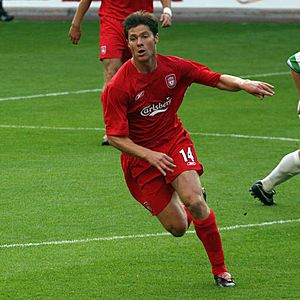
Alonso showed more of his talent in a Premier League game against Fulham. Liverpool was losing 2–0 at half-time. Benítez brought Alonso on as a substitute after the break. He helped Liverpool come back, and they won 4–2. Alonso also scored his first goal for the team from a free kick, putting Liverpool ahead.
Alonso kept scoring important goals for the club. He scored his first goal at Anfield against Arsenal in a 2–1 win. Alonso was very happy and felt he was settling in well in England. The Arsenal game saw Steven Gerrard return from injury. However, Alonso's midfield partnership with the team captain was cut short. Alonso broke his ankle after a tackle from Frank Lampard in Liverpool's 0–1 loss to Chelsea on New Year's Day 2005. He was out of action for three months.
Alonso returned to the team in the Champions League quarter-final against Juventus. Alonso was not fully fit, but since Steven Gerrard was injured, he played for the whole 90 minutes. Liverpool drew 0–0 in Italy, beating the Italian champions on aggregate. Kevin McCarra from The Guardian praised Alonso's skill. He said Alonso showed that good technique can overcome a serious injury. In the next round against Chelsea, Alonso got a yellow card in a tough 0–0 draw. This meant he couldn't play in the next game. Alonso was very upset about missing the game. Gerrard returned from injury for the second leg, and Liverpool won 1–0, reaching the final against Milan.
Liverpool finished fifth in the Premier League, which was not great. But Alonso still had a chance for glory in his first season: the Champions League final. The team fell three goals behind Milan but made an amazing comeback in the second half. Liverpool, losing 3–2, got a penalty. Alonso took the shot. Dida, Milan's famous goalkeeper, saved the penalty. But Alonso quickly shot the rebound into the net, making the score 3–3. Extra time passed without any more goals. Liverpool won 3–2 in the penalty shootout. Alonso was praised for his key role in the team's comeback. Manager Benítez said he was very important to the team. Alonso was thrilled with the win, calling it "the best moment in my professional career." That unforgettable night is known as the 'Miracle of Istanbul'.
Winning the FA Cup (2005-06)
Alonso played in almost every game in the 2005–06 season. He mostly avoided the injuries that had affected his first season. In the summer, Peter Crouch joined Liverpool. Some people thought the team would start using long ball tactics because of Crouch's height. Crouch denied this, saying that Alonso's passing, along with Gerrard's, would define Liverpool's style. Alonso faced more competition from new player Mohamed Sissoko. However, Steven Gerrard's injuries and Rafael Benítez's preference for a 4–5–1 formation kept Alonso in the team. Alonso played in all of Liverpool's Champions League games. But the team was not as dominant as the previous season and lost to Benfica in the knockout stage.
On January 7, 2006, in an FA Cup third-round game against Luton Town, Alonso helped Liverpool win 5–3. They had been losing 3–1 early in the second half. Alonso scored two amazing goals from far away: one from 45 yards, and another from 65 yards, from behind the half-way line. These goals brought good luck to a Liverpool fan who won £25,000 from a £200 bet that Alonso would score from his own half. Alonso got an ankle injury in a 3–1 win against Portsmouth. This made his participation in the FA Cup final uncertain. However, he recovered enough to start the game against West Ham United. Gerrard scored Liverpool's third goal from Alonso's free kick, putting the team ahead. Alonso, still hurt, couldn't play the whole 90 minutes and was substituted. Liverpool won on penalties without him, but Alonso still earned his first FA Cup winner's medal.
Later Years at Liverpool (2006-2009)
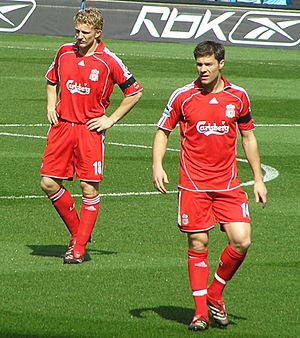
On September 20, 2006, Alonso scored what the BBC called "an outrageous strike" from his own half. This happened in a 2–0 Premier League win against Newcastle United. Andy Hunter of The Independent said it was "one of the most audacious goals in Anfield's rich 115-year history." Alonso said his 70-yard goal was not just luck. He practiced long-range shots as part of his training. Even though the goals from his own half were similar, Alonso knew which one was better. He said, "I think this was better. The Luton goal bounced a few times, this one went quite straight. The Luton one was left-footed – it was different – but I am quite happy to score the goal." It was his first goal for Liverpool since the Luton goal. This made him the only outfield player in modern professional football to score two goals in a row from inside his own half.
On June 8, 2007, Alonso signed a new five-year contract. He said, "I knew there was interest from other clubs but it was always my idea to stay here. I have been here for three seasons now and have such special feelings for the club and the supporters. I understand what Liverpool means to so many people. It is such a special club and I just didn't want to leave." The 2007–08 season started well for him. Gerrard's absence meant Alonso played further forward. He scored twice in a 6–0 win against new Premier League team Derby County. But this good start didn't last. A small injury from a game against Portsmouth got worse in training. This foot injury kept him out for six weeks. His return to the team was rushed, and the injury came back in his first game. Alonso's strong will to play actually hurt him. He later said, "I had been feeling a bit tired around that time because it was only my first game back and the match was very fast. But as a player you don't want to come off, particularly when the team is winning and I stayed on."
Alonso returned from injury in December 2007. But in the following months, he faced more competition for a midfield spot from Javier Mascherano and Lucas. However, his place in Liverpool's five-man midfield was secure. Rafael Benítez saw him as "a top class player." He said Alonso could change games and break down the opponent's defense. Alonso played his 100th league game for Liverpool on January 12, 2008, against Middlesbrough.
The summer of 2008 suggested Alonso might leave Liverpool. The club was trying to sign England international Gareth Barry to replace him. By the start of the 2008–09 season, neither Alonso nor Barry had moved clubs. But the long transfer talk made Alonso feel uneasy at Liverpool. He was unsure about his place in the team. However, the club's fans did a lot to cheer him up. They supported him on and off the pitch. Alonso responded to this, saying:
- "[The fans] couldn't have done more to show me how they felt... If I went out for lunch or a coffee, there was always someone who would come over and say, 'We'd love you to stay'. I'm just glad that, in the end, nothing came of it [the transfer] because it wasn't something I ever asked for."
Despite the summer events, Alonso started the season confidently. Both his teammates and the media praised his strong character. They said his influence helped the team start the season well. Alonso's importance was clear when he scored the only goal in a 1–0 win against Chelsea. This made Liverpool the first away team to win at Stamford Bridge in over four years. Statistics showed Alonso's good form. On December 11, figures showed he was the first Premier League player to complete 1,000 successful passes that season. His last goal for Liverpool came in their 3–1 away win at Hull City on April 25. He scored after his free kick bounced off the Hull wall.
Playing for Real Madrid
First Seasons with Real Madrid (2009-10)
Alonso completed his £30 million move to Real Madrid on August 5, 2009. Some people believe he never wanted to leave Liverpool, as his contract was until at least 2012. They suggest his departure was due to disagreements with manager Benítez. Former teammate Steven Gerrard said he was "devastated" by Alonso's decision. He also said Alonso's leaving was one reason for Liverpool's poor start to the next season.
Alonso was given the number 22 jersey at Madrid. He played as a holding midfielder. He scored his first goal for his new team on February 21, 2010. It was a penalty against Villarreal in a 6–2 win. Unless he was injured or suspended, manager Manuel Pellegrini started Alonso in every Champions League and La Liga match in his first season. In La Liga, he helped the club finish with a record 96 points. They were three points behind winners Barcelona. This was the third time Alonso helped his team set a new club record for points, while finishing second. (He did this with Real Sociedad in 2002–03 and with Liverpool in 2008–09). In his first season at Real Madrid, Alonso scored three goals. He was seen as one of the club's "most consistent" players.
Readers of Marca newspaper chose Alonso for their La Liga team of the season as the best defensive midfielder. The only other Real Madrid player chosen was Cristiano Ronaldo. Alonso received the same honor from ESPN Soccernet. He was also nominated for the LFP Awards, given by the Spanish Football league. Alonso was nominated for Best Midfielder, along with Xavi and Javi Martínez. Many Spanish journalists and Real Madrid fans gave Alonso a new nickname during the season: La Barba Roja ("The Red Beard").
Champions League Victory (2010-14)
Alonso's second season at Real Madrid began with a new manager, José Mourinho. He was given the number 14 jersey after vice-captain Guti left. He scored his only goal of the season against Real Murcia in the Copa del Rey. He helped the team win the Copa del Rey for the first time in 18 years.
Alonso started his third season at Madrid by scoring the second goal in a 2–2 draw against Barcelona. This was in the 2011 Supercopa de España at the Santiago Bernabéu Stadium. On September 21, 2011, he played his 100th official game for Real Madrid in a 0–0 draw against Racing de Santander. Alonso won his first league title of his career that season.
On January 8, 2014, Alonso signed a new contract with Real Madrid. This deal would have kept him at the club until 2016. On April 29, 2014, Real Madrid beat Bayern Munich 4–0 in the second leg of their Champions League semi-final. They qualified for the final with a 5–0 total win. Alonso received a yellow card after a sliding tackle in the first half. Since he already had two yellow cards before the match, this meant he could not play in the final. He still earned his second Champions League winner's medal as Real defeated Atlético Madrid 4–1 in extra time.
Playing for Bayern Munich
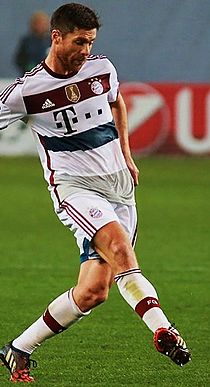
On August 29, 2014, Alonso moved to Bayern Munich. He signed a two-year deal for an unknown fee. He played his first game the next day, starting in a 1–1 draw at Schalke 04. On September 27, 2014, in the match against 1. FC Köln, Alonso broke the record for most passes completed in a Bundesliga game, with 196. He scored his first goal for the club on October 18, 2014. It was a free kick in a 6–0 win over Werder Bremen.
In his 100th Champions League game, on February 17, 2015, Alonso was sent off for a second yellow card. This happened in a 0–0 draw against Shakhtar Donetsk. On April 28, he was one of four Bayern players who missed a penalty in a shootout. Bayern lost 2–0 to Borussia Dortmund in the DFB-Pokal semi-final. He was also the only player to miss when the club lost a shootout at the end of the 2015 DFL-Supercup away to VfL Wolfsburg. His shot was saved by goalkeeper Koen Casteels.
Alonso signed a new contract with Bayern on December 18, 2015. This kept him at the club until 2017. On March 9, 2017, Alonso announced on Twitter that he would retire from playing at the end of the 2016–17 season. He and Bayern captain Philipp Lahm played their last professional game on May 20. It was a 4–1 home win against Freiburg. He assisted the first goal for Arjen Robben. He was substituted in the 82nd minute for Franck Ribéry.
International Career with Spain
Euro 2004
Alonso was first called up for the Spain national football team by manager Iñaki Sáez. This was for a friendly match against Ecuador on April 30, 2003, when he was 21. He started in the 4–0 win at the Vicente Calderón Stadium.
Sáez included Alonso in the UEFA Euro 2004 squad in Portugal. He came on as a substitute in the win over Russia. He then started in the loss to the hosts. Spain was knocked out in the group stage.
2006 World Cup
Alonso was part of the Spanish squad for the 2006 FIFA World Cup. He scored Spain's first goal of the tournament, which was also his first international goal. This happened against Ukraine on June 14, 2006. Spain won all their games in the group phase. However, they were beaten by France, who later reached the final, in the first knockout stage of the tournament.
Euro 2008
Liverpool's 2007–08 season ended without any trophies. But Alonso had a chance to win honors in the Euro 2008 tournament. Alonso mostly played as a substitute. However, with key players resting, he captained Spain in the final group game against Greece. He earned the man of the match award for his performance. Despite playing well, he couldn't get a starting spot in the team. This showed how strong Spain's squad was. Spain went on to win the tournament, and Alonso played in four of their six matches. He told Spanish journalist Guillem Balagué that Spain's victory was deserved. He said the players' teamwork was very important to their unbeaten run. Alonso was thrilled, saying, "It's incredible and we're all walking around in a dream. It's fantastic." Alonso scored twice in a 3–0 friendly win against Denmark on August 20.
2009 Confederations Cup
At the 2009 FIFA Confederations Cup in South Africa, Spain was knocked out in the semi-finals by the United States. In the third-place play-off against the hosts, the game went to extra time after ending 2–2. Alonso scored a free kick in the 107th minute to win the game.
2010 World Cup
Alonso started every game for Spain during the 2010 tournament. He played alongside Sergio Busquets and Xavi in midfield. He helped his team win their first ever World Cup trophy. In the 28th minute of the final against the Netherlands, he received a "Kung fu-style" kick to the chest from Dutch midfielder Nigel de Jong. This foul was controversial because it looked like it should have been a red card. However, the referee Howard Webb only gave a yellow card. This left Alonso in pain and worried about a broken rib. Despite the pain, he continued playing for another hour.
Euro 2012
On June 23, 2012, Alonso played his 100th match for Spain. This was in the quarter-finals against France, where he scored both goals in a 2–0 victory. His first goal came from a header after a cross from Jordi Alba. The second goal was from a penalty kick. This penalty was given after Pedro was fouled in the last seconds of the match. Alonso's penalty in the semi-final shootout against Portugal was saved by Rui Patrício. However, Spain still won the shootout 4–2 after a 0–0 draw in the game. Spain then beat Gianluigi Buffon and Italy 4–0 in the final. This was Alonso's third major title win with Spain.
2014 World Cup
Spain was again among the favorites to win the 2014 FIFA World Cup. However, they were knocked out in the first round. Alonso scored a penalty in the 27th minute of their first match against the Netherlands. He was substituted in the 62nd minute when Spain was down 2–1, and they eventually lost 5–1. Spain then lost 2–0 to Chile. Alonso received a yellow card in the first half and was substituted at half-time, with the score already 2–0. Spain was then eliminated from the tournament. They did win their final match 3–0 against Australia, and Alonso played 83 minutes in that game.
Alonso retired from international football on August 27, 2014.
Playing for Basque Country
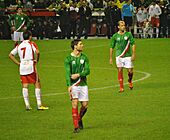
Alonso played his first game for the Basque Country national team in a friendly against Ghana on December 29, 2001. He was called up regularly after that. However, because of his busy club schedule, he couldn't always play. Most recently, Alonso played for Basque on December 29, 2012, in a 6–1 win over Bolivia.
Xabi Alonso's Playing Style
Alonso was a consistent and hardworking midfielder. He is seen as one of the best midfielders of his time. He was good at both creating chances and defending.
He had great technique, excellent vision, and could pass the ball in many ways. He was excellent in the center as a deep-lying playmaker. From this position, he used his accurate long passing to create scoring chances for his teammates. He also had a powerful and accurate shot from far away. He was good at taking set-pieces and penalty kicks. Because of his height, positioning, and strength, Alonso was also good in the air. He often scored goals with his head from set pieces when he moved into more attacking positions.
Besides his creative skills, he was also a great defensive midfielder. This was thanks to his strength and strong body. He was also very determined, smart about tactics, and good at tackling. He could also "read the game" well, meaning he understood what was happening on the field. Sometimes, he was criticized for making quick, hard tackles and getting unnecessary yellow cards.
Jonathan Wilson wrote in 2013 that Alonso was a creative type of holding midfielder. He said Alonso, "although capable of making tackles, focused on keeping the ball moving, occasionally raking long passes out to the flanks to change the angle of attack like an old-style regista." His role has also been compared to a metodista in Italian football. This means he could control the game in midfield and also help his team defend.
Since retiring, Steven Gerrard has said he believes Alonso was the best midfielder he ever played with. In March 2017, his former Bayern Munich manager Pep Guardiola described Alonso as one of the best midfielders he had ever seen.
Coaching and Managerial Career
Early Coaching Years
Coaching Real Madrid U14
In 2018, Xabi Alonso returned to Real Madrid. He was completing his UEFA Elite coaching course with former teammates like Raúl and Xavi. He took on a role coaching the Real Madrid U14 team.
Managing Real Sociedad B
Alonso was named manager of Segunda División B club Real Sociedad B on June 1, 2019. He started the job on July 9. In his first game on August 24, his team drew 1–1 at home against Burgos.
In Alonso's second season with Sanse (Real Sociedad B), the club won promotion to the Segunda División. They achieved this after a play-off win against Algeciras on May 22, 2021. This meant Real Sociedad B would play in the Segunda División for the first time since 1961–62. In March of that year, even though he was strongly linked to the manager job at Borussia Mönchengladbach, Alonso signed a one-year extension with Real Sociedad B.
In his first game in the second tier on August 14, 2021, Alonso's team won 1–0 at home against Leganés. The goal was scored by Jon Karrikaburu. On May 25, 2022, Real Sociedad announced that Alonso would leave Sanse at the end of the season. The team had already been relegated from the second division.
Managing Bayer Leverkusen
On October 5, 2022, Alonso was appointed as the new head coach of Bayer Leverkusen. His contract was until June 2024. He replaced Gerardo Seoane because the team was second from bottom after eight Bundesliga games. This was their worst start to a season since 1979. He debuted three days later with a 4–0 home win over Schalke 04. Leverkusen reached their first European semifinal in 21 years. However, they were knocked out by Roma, managed by his former Real Madrid coach José Mourinho, losing by a single goal over two legs. At the end of the season, Bayer Leverkusen finished in sixth place. This meant they qualified for the next season's Europa League. In May 2023, Alonso confirmed he would stay for a second season, despite interest from Tottenham Hotspur.
On August 4, 2023, Alonso signed a new contract until 2026. During the summer, he signed players like Switzerland captain Granit Xhaka, Jonas Hofmann, Alejandro Grimaldo, and Matěj Kovář. Alonso set up his team in a 3–4–3 formation. He focused on passing and quick counter-attacks. His team also only let in five goals from open play in their first 11 Bundesliga games. In the 2023–24 UEFA Europa League group stage, the team won all six games, scoring 19 goals. Leverkusen set a new record for unbeaten games, passing Bayern Munich's 32 in February 2024.
Alonso was linked to becoming the new manager of his former clubs Bayern Munich, Liverpool, and Real Madrid. However, on March 29, 2024, he said he would complete his contract. On April 14, Alonso led Leverkusen to a 5–0 win over Werder Bremen. This secured their first Bundesliga title and first German championship ever, with five games left to play. On May 9, he guided his team to a new European record of 49 competitive matches without defeat. This happened after a 2–2 draw against Roma in the Europa League semi-final second leg. This broke Benfica's record of 48 unbeaten games from 1963 to 1965. The streak was extended to 51 matches without defeat with two more Bundesliga wins. This meant they had a full unbeaten Bundesliga season. The streak ended with a 3–0 loss to Atalanta in the 2024 UEFA Europa League final. Leverkusen earned 40 points more than the previous season, a Bundesliga record. Club records were also broken: 28 wins, 90 points, 89 goals scored, 24 goals conceded, 10 games won in a row, and 16 clean sheets in a season. Alonso's Bayer Leverkusen also won the 2023–24 DFB-Pokal on May 25. They beat 1. FC Kaiserslautern 1–0 in the final to complete a domestic double.
Alonso began his third season at Leverkusen by winning the club's first DFL-Supercup. They beat VfB Stuttgart 4–3 on penalties. However, the club's league title defense started poorly with a 3–2 defeat to RB Leipzig in their second game of the season. This ended their 51-game domestic unbeaten run. This was followed by a run of 1 win and 5 draws out of 6 games, leaving Leverkusen 9 points behind Bayern Munich after 10 games. In the Champions League, Alonso led Leverkusen to 6th place in the league phase. This ensured automatic qualification to the knockout phase. However, the club's Champions League journey ended in the round of 16 after a 5–0 total loss to Bayern Munich. Leverkusen also lost their DFB-Pokal title. They were knocked out in the semi-finals by third-tier team Arminia Bielefeld.
On May 4, 2025, Leverkusen drew 2–2 away with SC Freiburg. This left them 8 points behind title rivals Bayern Munich with two games left. This confirmed Bayern as champions. Five days later, Alonso announced he would leave Leverkusen at the end of the season.
Managing Real Madrid
On May 25, 2025, Alonso's former club Real Madrid announced he would be their head coach for the next three seasons. He started on June 1, 2025. He replaced Carlo Ancelotti, who had been his manager at both Real Madrid (2013–2014) and Bayern Munich (2016–2017).
He debuted as Real Madrid head coach in the club's 2025 FIFA Club World Cup opener against Al-Hilal on June 18. The match ended in a 1–1 draw. Four days later, Alonso got his first win for Los Blancos. They won 3–1 against Pachuca, even though they played with ten men from the 7th minute.
Xabi Alonso's Management Style
Alonso is known for being a flexible manager. He uses a very organized but flowing system based on positional play. At Real Sociedad B, he first preferred the 4–3–3 or 4–2–3–1 formations. But at Bayer Leverkusen, he started using the 3–4–3 and 3–4–2–1 formations, and sometimes other systems. He is known for tactics like quick counter-pressing in central areas when his team doesn't have the ball. When his teams have the ball, they pass a lot from deep areas to build up play. They use practiced, structured patterns of play led by a deep-lying playmaker, like Granit Xhaka. They also use attacking wing-backs effectively to spread out the play. This helps his teams win the ball back high up the field and move it forward quickly and accurately. It also helps them break through the opponent's defense. His teams can also drop back into tight defensive blocks when needed. As a manager, his tactics are influenced by his time playing under Pep Guardiola, Carlo Ancelotti, José Mourinho, Rafael Benítez, and Vicente del Bosque. Besides his skill as a manager, he is also known for his good relationships with players.
Personal Life
Alonso's teammates at Liverpool thought he was a quiet and friendly person.
He is married to Nagore Aranburu, and they have three children: a son (born 2008) and two daughters (born 2010 and 2013). In March 2008, Alonso stayed in Merseyside to be with his wife when she gave birth. He said, "It was a little frustrating to miss the match against Inter but I have to be with my family at times like these." His choice to put his family first over a Champions League game caused some tension with manager Rafael Benítez. Alonso and Arsenal manager Mikel Arteta were neighbors on the same street when they were growing up in San Sebastián. Later, they lived near each other in Liverpool when Arteta played for Everton. Alonso convinced Arteta to transfer to Everton after telling him how happy he was living in Liverpool. Alonso also helped persuade former Real Sociedad teammate Juan Ugarte to move to Wales and join Wrexham in 2004.
Alonso's brother Mikel played for Spanish club Real Unión. He also spent a season on loan at Bolton Wanderers in the 2007–08 season. However, the team decided not to extend his loan, and he returned to Spain to train with Alonso's former club, Real Sociedad. Alonso has another brother, Jon, who works as a referee. Alonso is a fan of Meath Gaelic football. His interest in the Irish sport started when he was 15. He stayed with a family in the Irish town of Kells, County Meath to learn English and played the sport in his free time. Even while playing at Real Madrid, Alonso said he was a Liverpool supporter. He returns to watch games at Anfield when he can. In 2011, he was quoted in The Times Online saying, "I am still a Liverpool fan and will be forever, absolutely." He also said he would raise his Liverpool-born son as a Red supporter.
Honours
Player
Liverpool
- FA Cup: 2005–06
- FA Community Shield: 2006
- UEFA Champions League: 2004–05; runner-up: 2006–07
- UEFA Super Cup: 2005
- FIFA Club World Cup runner-up: 2005
Real Madrid
- La Liga: 2011–12
- Copa del Rey: 2010–11, 2013–14; runner-up: 2012–13
- Supercopa de España: 2012
- UEFA Champions League: 2013–14
Bayern Munich
- Bundesliga: 2014–15, 2015–16, 2016–17
- DFB-Pokal: 2015–16
- DFL-Supercup: 2016
Spain
Individual Awards
- Spanish Player of the Year: 2003
- BBC Goal of the Month: November 2004
- FIFA FIFPro World XI: 2011, 2012; 2nd team: 2014; 3rd team: 2013; 4th team: 2015; 5th team: 2016
- La Liga Best Midfielder: 2011–12
- UEFA European Championship Team of the Tournament: 2012
- UEFA Champions League Squad of the Season: 2013–14
- Bundesliga Team of the Season: 2014–15
Decorations
- Gold Medal of the Royal Order of Sporting Merit: 2011
Manager
Bayer Leverkusen
- Bundesliga: 2023–24
- DFB-Pokal: 2023–24
- DFL-Supercup: 2024
- UEFA Europa League runner-up: 2023–24
Individual Awards
- Globe Soccer Best Coach of the Year: 2024
- VDV Bundesliga Coach of the Season: 2023–24
- Football Manager of the Year in Germany: 2024
Images for kids
See also
 In Spanish: Xabi Alonso para niños
In Spanish: Xabi Alonso para niños
 | James Van Der Zee |
 | Alma Thomas |
 | Ellis Wilson |
 | Margaret Taylor-Burroughs |


